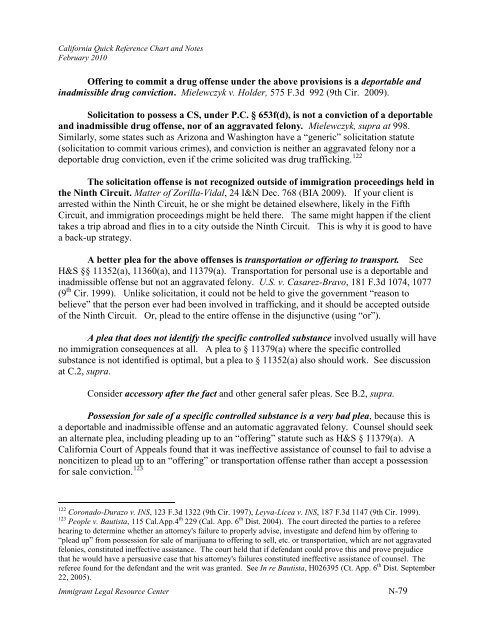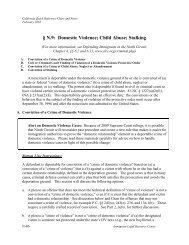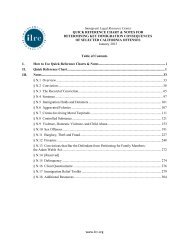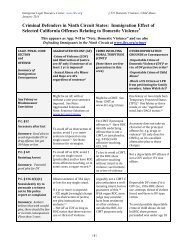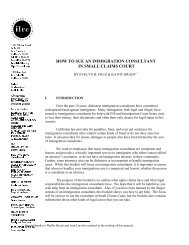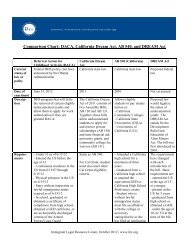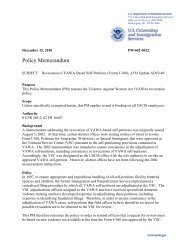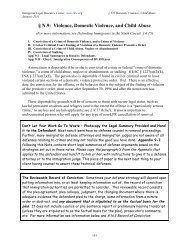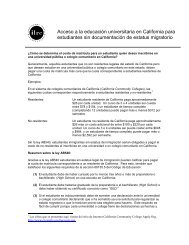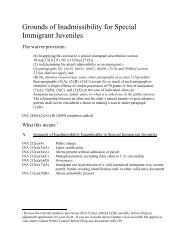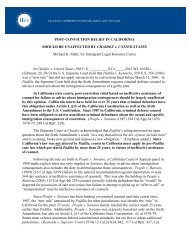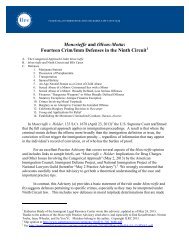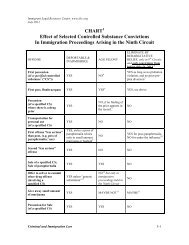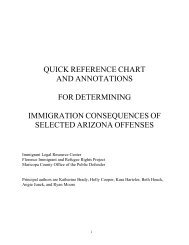quick reference chart and notes for determining immigration - ILRC
quick reference chart and notes for determining immigration - ILRC
quick reference chart and notes for determining immigration - ILRC
You also want an ePaper? Increase the reach of your titles
YUMPU automatically turns print PDFs into web optimized ePapers that Google loves.
Cali<strong>for</strong>nia Quick Reference Chart <strong>and</strong> Notes<br />
February 2010<br />
Offering to commit a drug offense under the above provisions is a deportable <strong>and</strong><br />
inadmissible drug conviction. Mielewczyk v. Holder, 575 F.3d 992 (9th Cir. 2009).<br />
Solicitation to possess a CS, under P.C. § 653f(d), is not a conviction of a deportable<br />
<strong>and</strong> inadmissible drug offense, nor of an aggravated felony. Mielewczyk, supra at 998.<br />
Similarly, some states such as Arizona <strong>and</strong> Washington have a “generic” solicitation statute<br />
(solicitation to commit various crimes), <strong>and</strong> conviction is neither an aggravated felony nor a<br />
deportable drug conviction, even if the crime solicited was drug trafficking. 122<br />
The solicitation offense is not recognized outside of <strong>immigration</strong> proceedings held in<br />
the Ninth Circuit. Matter of Zorilla-Vidal, 24 I&N Dec. 768 (BIA 2009). If your client is<br />
arrested within the Ninth Circuit, he or she might be detained elsewhere, likely in the Fifth<br />
Circuit, <strong>and</strong> <strong>immigration</strong> proceedings might be held there. The same might happen if the client<br />
takes a trip abroad <strong>and</strong> flies in to a city outside the Ninth Circuit. This is why it is good to have<br />
a back-up strategy.<br />
A better plea <strong>for</strong> the above offenses is transportation or offering to transport. See<br />
H&S §§ 11352(a), 11360(a), <strong>and</strong> 11379(a). Transportation <strong>for</strong> personal use is a deportable <strong>and</strong><br />
inadmissible offense but not an aggravated felony. U.S. v. Casarez-Bravo, 181 F.3d 1074, 1077<br />
(9 th Cir. 1999). Unlike solicitation, it could not be held to give the government “reason to<br />
believe” that the person ever had been involved in trafficking, <strong>and</strong> it should be accepted outside<br />
of the Ninth Circuit. Or, plead to the entire offense in the disjunctive (using “or”).<br />
A plea that does not identify the specific controlled substance involved usually will have<br />
no <strong>immigration</strong> consequences at all. A plea to § 11379(a) where the specific controlled<br />
substance is not identified is optimal, but a plea to § 11352(a) also should work. See discussion<br />
at C.2, supra.<br />
Consider accessory after the fact <strong>and</strong> other general safer pleas. See B.2, supra.<br />
Possession <strong>for</strong> sale of a specific controlled substance is a very bad plea, because this is<br />
a deportable <strong>and</strong> inadmissible offense <strong>and</strong> an automatic aggravated felony. Counsel should seek<br />
an alternate plea, including pleading up to an “offering” statute such as H&S § 11379(a). A<br />
Cali<strong>for</strong>nia Court of Appeals found that it was ineffective assistance of counsel to fail to advise a<br />
noncitizen to plead up to an “offering” or transportation offense rather than accept a possession<br />
<strong>for</strong> sale conviction. 123<br />
122 Coronado-Durazo v. INS, 123 F.3d 1322 (9th Cir. 1997), Leyva-Licea v. INS, 187 F.3d 1147 (9th Cir. 1999).<br />
123 People v. Bautista, 115 Cal.App.4 th 229 (Cal. App. 6 th Dist. 2004). The court directed the parties to a referee<br />
hearing to determine whether an attorney's failure to properly advise, investigate <strong>and</strong> defend him by offering to<br />
“plead up” from possession <strong>for</strong> sale of marijuana to offering to sell, etc. or transportation, which are not aggravated<br />
felonies, constituted ineffective assistance. The court held that if defendant could prove this <strong>and</strong> prove prejudice<br />
that he would have a persuasive case that his attorney's failures constituted ineffective assistance of counsel. The<br />
referee found <strong>for</strong> the defendant <strong>and</strong> the writ was granted. See In re Bautista, H026395 (Ct. App. 6 th Dist. September<br />
22, 2005).<br />
Immigrant Legal Resource Center N-79


